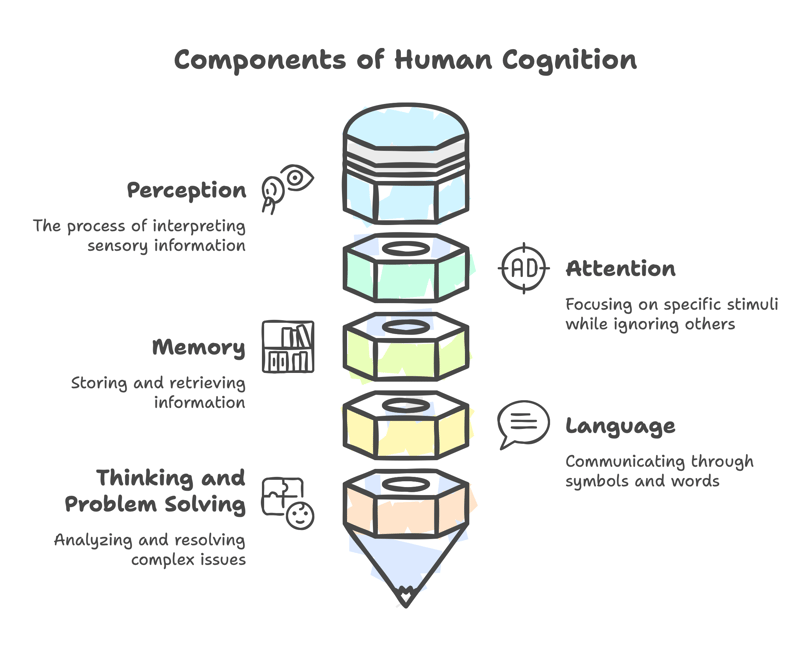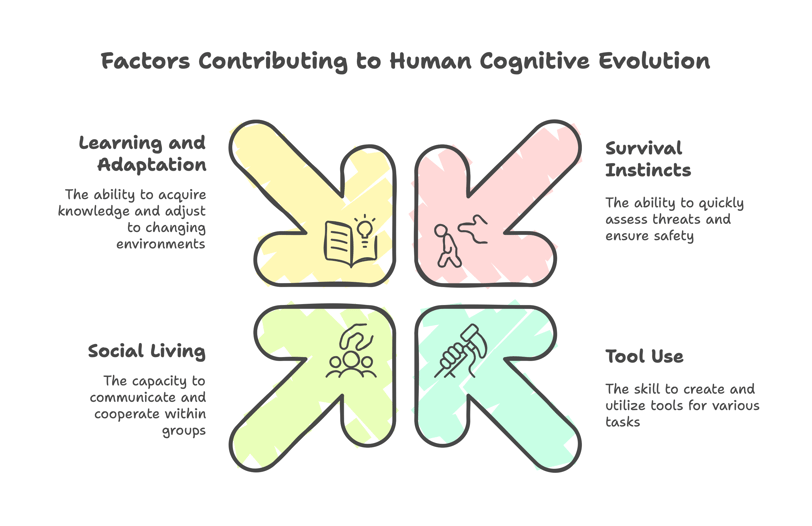Chapter 1: Cognitive Shenanigans
The User Manual Your Brain Didn't Come With
5/3/20257 min read


Ever wonder why your brain remembers obscure movie quotes perfectly but forgets what your boss just said in the meeting? Or why you're so deep in your thoughts while driving home that you sail right past the exit you've taken hundreds of times before? Our brains are fascinating puzzles—the more we try to understand them, the more amazing they turn out to be.
In this series of articles I try to explore, understand and share the workings of human cognition and its glitches called biases and how that has helped shape the world as we know it.
Cognition:
As a product manager who stumbled into the fascinating world of human psychology, I've been on quite the journey myself trying to understand what makes people tick. It all started when I realized that to build products people actually want, I needed to understand how their brains work. Little did I know I was opening Pandora's box of "whoa, that's why I do that!" moments.
Let's start with the basics: cognition. Now, this might sound like something only neuroscientists discuss over expensive coffee, but trust me—it's actually pretty simple, and understanding it has changed how I see everything.
Our brains are essentially the world's most impressive supercomputers. But supercomputers aren't just calculating; they're feeling, wondering, and experiencing the world in technicolor. Cognition is simply all the mental magic our brains perform to make sense of everything around us and figure out what to do next.
It's how we learn that hot stoves hurt (ouch!), remember our first crush's name twenty years later, solve puzzles, and even occasionally pay attention when our boss is talking (though sometimes that's harder than finishing a Netflix series in one sitting, right?). But what does cognition actually look like in real life? Let me share a scene that probably feels familiar..
Cognition in Action: Why My Wife Thinks I'm Selectively Deaf
Picture this: I'm watching something absolutely riveting on TV. My wife says something to me. I nod and murmur "uh-huh" without processing a single word. Fifteen minutes later, panic sets in: "Wait, what did she ask me to do?" And then comes the dreaded moment where I have to decide whether to admit I wasn't listening or just hope it wasn't important. (And let's be honest, who doesn't fear their wife a little in these moments? 😉)
This everyday scenario is actually our cognitive Swiss Army knife in action (or inaction, depending on how you look at it). Let me break down what's happening with the various cognitive tools at play:
Perception: This is how our brains transform sensory input into meaning. During my TV trance, my eyes and ears are technically receiving signals—both from the TV and my wife's voice. But my brain is selectively processing the TV signals and basically filing my wife's voice under "deal with later." It's not just seeing light; it's seeing a character on screen. It's the difference between hearing noise and recognizing the theme from "Game of Thrones" from just two notes (while somehow missing my wife's entire sentence).
Attention: This is our brain's built-in spam filter and honestly, sometimes I think mine needs an upgrade! During the TV scenario, my mental spotlight is laser-focused on whatever show I'm watching, tuning out everything else—including important household requests. That ability to focus is amazing when directed at the right things, but it's also why I can be completely oblivious to someone standing right in front of me. Sometimes it works perfectly; other times it's about as reliable as weather forecasts.
Memory: I think of this as my internal hard drive versus RAM. When I'm in TV mode, my wife's words might briefly enter my short-term memory (RAM), but without proper attention, they never get transferred to my working memory. Later, when I snap out of my TV trance, I might have a vague recollection that she said something, but can't access what it was. Meanwhile, my long-term memory (hard drive) still perfectly stores childhood birthday parties and important product specs from three jobs ago that randomly become relevant again.
Language: The original social network. In my TV trance example, the words my wife spoke literally entered my ears but weren't processed into meaning. It's like when someone speaks a foreign language to you—you hear sounds but don't extract meaning. Language is what makes our communication incredibly nuanced and powerful... when we're actually listening.
Thinking and Problem-Solving: Once I realize I've missed something important, my brain kicks into problem-solving mode. Now I'm frantically trying to solve the mystery of what I missed, weighing options like "Should I just ask her what she said and admit I wasn't listening?" or "Should I wander around the house looking busy until I figure out what I was supposed to do?" This is where the magic usually happens in my work life too. There are these moments when I'm stuck on a seemingly impossible problem, and suddenly, disparate pieces of information—a casual conversation with a colleague, something I read months ago, an observation from a completely unrelated field—all connect in this magical moment. The dots join, and BAM! Solution found. It's like cognitive alchemy.
What's fascinating is I've noticed my 2-year-old daughter does the exact same thing (the apple doesn't fall far from the tree, as they say). She can be so absorbed in her cartoons that a snack offering goes completely unnoticed—until the TV goes off, and suddenly she remembers she was "starving" all along.


From Survival Machines to Meme Storage Devices
Now, why did we humans evolve to have such powerful brains? Well, it wasn't to remember dance moves or quote "The Office." Though watching my daughter grow from a tiny human who could barely focus her eyes to a toddler who can manipulate me into giving her extra dessert has given me a front-row seat to how nature programs our brains as we develop.
Think back to our very, very distant ancestors—life was basically a never-ending episode of "Survivor," but with actual survival at stake.
Survival: Imagine an early human seeing strange tracks in the mud. Their brain had to quickly determine if they were about to become the main course in a predator's dinner. That quick thinking meant the difference between life and death.
Tool Use: Making tools requires serious brainpower. As someone who's tried (and often failed) at DIY projects around the house, I have enormous respect for our ancestors who figured out how to turn a rock into a spear without YouTube tutorials.
Social Living: Humans are social animals, like "Friends" but with less coffee and more life-threatening scenarios. We need to communicate ("DANGER!"), understand what others are thinking ("That person looks scared—maybe there's a threat?"), and cooperate ("Let's work together!"). Try hunting a mammoth without teamwork—it's like trying to move a couch up a spiral staircase by yourself. Not happening.
Learning and Adaptation: The world is constantly changing and unpredictable. Our ability to learn and adapt is what took us from cave paintings to smartphones. That's cognitive evolution—from "fire hot, ouch" to landing rovers on Mars.
But here's where things get really interesting: these cognitive abilities didn't just help us survive—they helped us dominate.


The Ultimate Cheat Code
In a nutshell, our amazing brains gave us a huge advantage. We weren't the strongest creatures (Hulk we are not), or the fastest, but our brains allowed us to solve problems, create solutions, and build complex societies where we could eventually develop things like indoor plumbing, delicious food, and binge-worthy entertainment that occasionally makes us ignore our spouses.
We became Earth's ultimate problem-solvers, turning our cognitive abilities into civilization's greatest cheat code. And that, dear reader, is why understanding how our brains work is so much more impressive than understanding how our smartphones work—because our brains invented the smartphone in the first place.
Sometimes I find myself lost in thought about a work problem, and then suddenly I'm thinking about teleportation (wouldn't that be an amazing product?), which leads to wondering why we haven't invented it yet, which leads to researching scientific developments in teleportation, which leads to making a list of movies about teleportation to watch tonight. Two hours later, I snap back to reality and wonder: "Wait, where was I? How did I get here?" It's like my brain creates these wormholes where time expands or contracts depending on how engaged I am. That's cognition for you—fascinating, maddening, and endlessly surprising.
Coming Up Next: When Our Brains Take Shortcuts
In the next chapter, we'll explore how these magnificent brains of ours sometimes take shortcuts that can lead to mistakes or biases. After all, even the world's best operating system has its glitches! Like when I convince myself I can totally afford that new tech gadget when it's offered with a "pay later" option, even though the rational part of my brain knows I'm paying exactly the same amount (or more with interest). We'll dive into why our brains create these mental shortcuts, spoiler alert: they were actually helpful for our cave-dwelling ancestors.
Until then, pay attention to your own cognitive processes at work. You might be surprised at how often you catch yourself lost in a thought wormhole or nodding along to a conversation while your brain is completely elsewhere. Don't worry—we're all cognitive works in progress, figuring this out together!